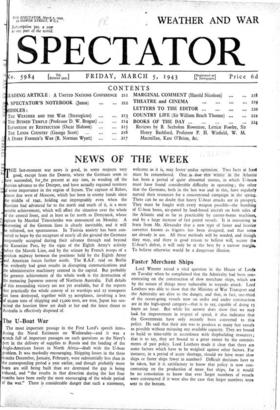The U-Boat War
The most important passage in the First Lord's speech intrG- ducing the Naval Estimates on Wednesday—and it was a speech full "of important passages on such questions as the Navy's part in the delivery of supplies to Russia and the landing of the Anglo-American forces in North Africa—dealt with the U-boat problem. It was markedly encouraging. Shipping losses in the three months December, January, February, were substantially less than in the corresponding period a year earlier, and though probably more boats are still being built than are destroyed the gap is being reduced, and " the results in that direction during the last four months have been easily the most encouraging of the whole period of the war." There is considerable danger that such a statement, welcome as it is, may foster undue optimism. Two facts .at least must be remembered. Onc_is—shat.--this—witifer in the Atlantic has been a period of quite abnormal storms, in which U-boats must have found considerable difficulty in operating ; the other that the Germans, both in the last war and in this, have regularly nursed their resources for a concentrated campaign in the spring. There can be no doubt that heavy U-boat attacks are in prospect. They must be fought with every weapon possible—the bombing of U-boat bases, air-patrol by land-based aircraft on both sides of the Atlantic and so far as practicable by carrier-borne machines, and by a large increase of fast patrol vessels. It is reassuring to learn from Mr. Alexander that a new type of faster and heavier corvettes known as frigates has been designed, and that some are already in use. All these methods will be needed, and though they may, and there is good reason to believe will, secure the U-boat's defeat, it will only be at the best by a narrow margin, To believe otherwise would be a dangerous illusion.


























